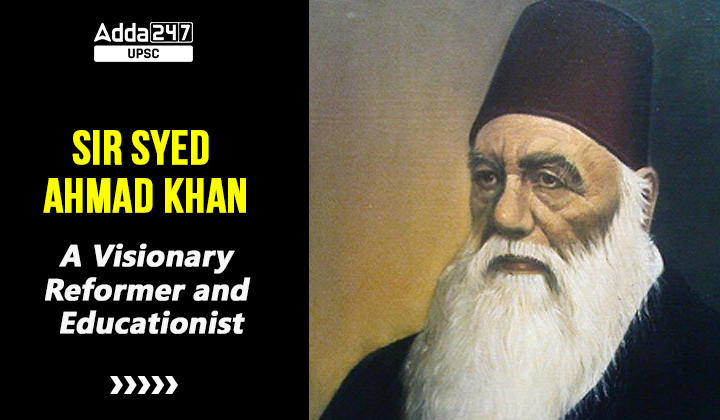Table of Contents
Sir Syed Ahmad Khan: Sir Syed Ahmad Khan, born on October 17, 1817, in Delhi, was a visionary leader, social reformer, and educationist in 19th-century British India. His life and work spanned a crucial period of transition and transformation, and he played a pivotal role in addressing the educational and socio-economic challenges faced by the Muslim community during that time.
Sir Syed Ahmad Khan
Sir Syed belonged to a family of nobles and scholars, and he received his early education in Arabic, Persian, and Islamic studies. However, the changing political landscape in India, marked by the decline of the Mughal Empire and the rise of British colonial power, influenced Sir Syed’s perspective on the challenges facing his community. The 1857 Indian Rebellion, also known as the Sepoy Mutiny, further deepened his concerns about the status of Muslims in the changing socio-political landscape.
Education Initiatives
One of Sir Syed’s most significant contributions was in the field of education. Recognizing the importance of modern education for the empowerment of Muslims, he founded the Muhammadan Anglo-Oriental College in Aligarh in 1875. This institution, later known as the Aligarh Muslim University (AMU), became a pioneering center of education that aimed to provide both modern and Islamic knowledge. Sir Syed’s vision for AMU was to equip Muslims with the skills and knowledge necessary to thrive in the modern world while retaining their cultural and religious identity.
The founding of AMU was not merely the establishment of an educational institution; it marked the beginning of the Aligarh Movement—a socio-educational reform movement that sought to uplift the Muslim community in various aspects of life. The movement addressed the educational backwardness of Muslims and advocated for their social and economic progress through education.
Sir Syed Ahmad Khan’s approach to education was pragmatic and forward-looking. He emphasized the learning of English and the sciences, viewing them as essential for success in the changing times. This pragmatic approach was driven by his belief that Muslims needed to adapt to the modern education system to compete effectively in the job market and other spheres of life. At the same time, he promoted the study of Islamic sciences to ensure that Muslims remained connected to their cultural and religious roots.
Urdu as a Medium of Instruction
One of the notable aspects of Sir Syed’s educational philosophy was his insistence on Urdu as the medium of instruction. Recognizing the linguistic and cultural diversity among Muslims, he believed that Urdu could serve as a unifying language that would bridge the gap between various Muslim communities. This emphasis on Urdu contributed significantly to the development and promotion of the language in the Indian subcontinent.
Social Reforms
Sir Syed Ahmad Khan’s contributions extended beyond education. He was deeply committed to social reform, advocating for changes in Muslim society to address prevalent social issues. He discouraged the purdah system and encouraged the education of women, recognizing the importance of women’s empowerment for the overall progress of the community.
Two-Nation Theory
Another facet of Sir Syed’s legacy is his engagement with the idea of a separate political identity for Muslims. While he did not explicitly call for the creation of a separate Muslim state, his writings and speeches laid the groundwork for the Two-Nation Theory, which later became a significant ideological foundation for the creation of Pakistan in 1947. Sir Syed argued that Muslims and Hindus were distinct nations with different customs, traditions, and ways of life. This perspective gained traction in the decades following Sir Syed’s death and played a crucial role in shaping the political landscape of British India.
Literary Contributions
Sir Syed Ahmad Khan’s literary contributions were also noteworthy. He was a prolific writer and penned numerous works in Urdu. His literary endeavors included historical writings, commentaries on scientific advancements, and essays on various social issues. “Asar-us-Sanadid,” his seminal work on the architecture of Delhi, showcased his deep interest in preserving and documenting the cultural heritage of the region.
Legacy
The legacy of Sir Syed Ahmad Khan is enduring and multi-faceted. Aligarh Muslim University, the institution he founded, has grown into one of the most prestigious universities in India. It continues to be a hub of academic excellence and a symbol of the educational empowerment of Muslims. The Aligarh Movement, initiated by Sir Syed, had a far-reaching impact on the Muslim community’s educational and social development.
Sir Syed’s vision and efforts also left an indelible mark on the broader socio-political landscape of South Asia. The Two-Nation Theory, which gained momentum in the subsequent decades, shaped the course of Indian history and led to the creation of Pakistan as a separate Muslim state in 1947.
Despite the passage of time, Sir Syed Ahmad Khan remains a revered figure in the history of India and Pakistan. His ideas, teachings, and contributions are celebrated not only by Muslims but by all those who value education, social reform, and the promotion of a harmonious society.
Conclusion
In conclusion, Sir Syed Ahmad Khan’s life was a tapestry of diverse accomplishments—ranging from education and social reform to literature and political thought. His legacy lives on through the institutions he founded, the ideas he propagated, and the positive changes he brought about in the lives of countless individuals. Sir Syed’s enduring impact on the intellectual, educational, and social spheres of South Asia cements his status as a visionary reformer and a beacon of enlightenment in the history of the subcontinent.



 TSPSC Group 1 Question Paper 2024, Downl...
TSPSC Group 1 Question Paper 2024, Downl...
 TSPSC Group 1 Answer key 2024 Out, Downl...
TSPSC Group 1 Answer key 2024 Out, Downl...
 UPSC Prelims 2024 Question Paper, Downlo...
UPSC Prelims 2024 Question Paper, Downlo...
